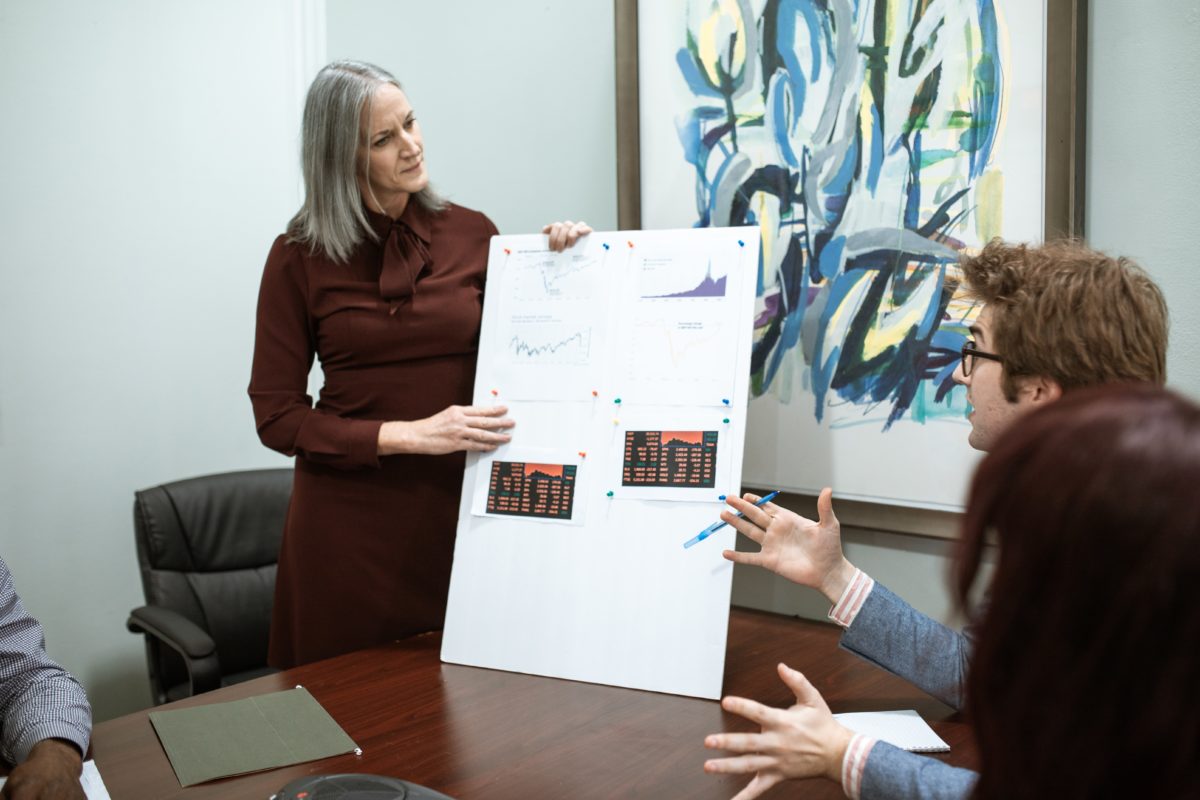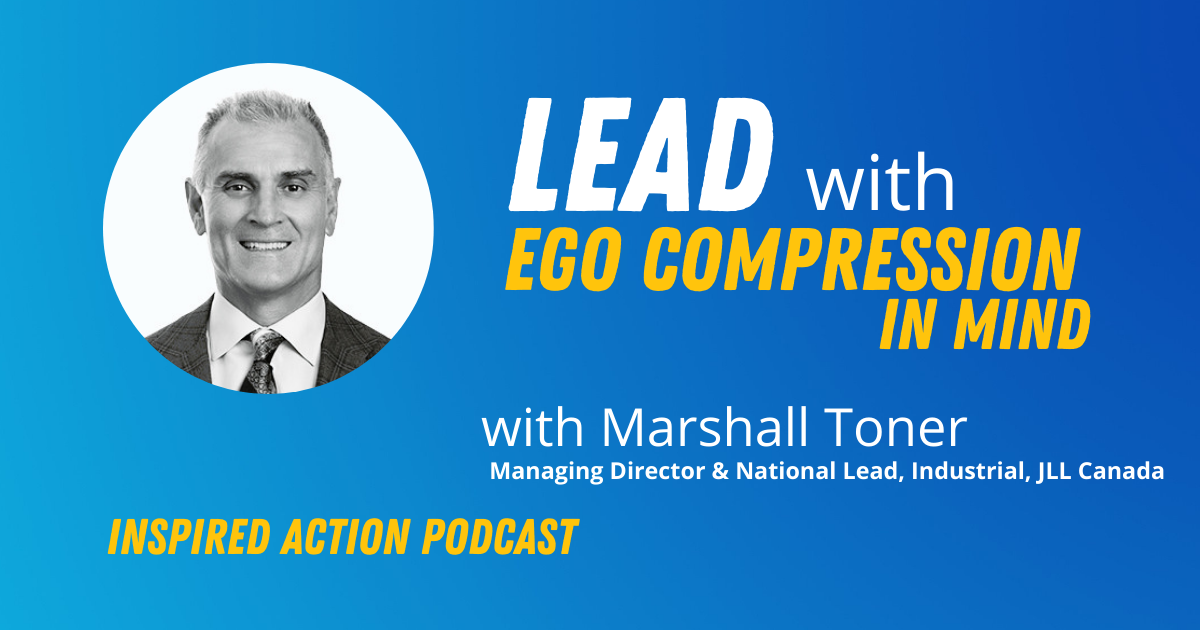“Lead with Ego Compression in Mind” Brief Summary:
Are you leading your teams with it in mind? Are you making sure your teams have buy-in to your initiatives? Are you leading with ego compression in mind? In this Inspired Action For Imperfect Humans podcast episode Host Kyle Kalloo, and Managing Director & National Lead for JLL Canada, Marshall Toner discuss ego compression and why it’s important to have it in mind when leading your teams, and getting buy-in.
“I’m a believer of good leadership is about, you know, owning the failure, you know, and lots of leaders want it the other way around. They want to throw people under the bus box. Yes. I found early in life that very well. And, you know, it takes a certain amount of ego compression to do that as it’s really great to put up your hand where things are going well, uh, very difficult with when you’ve had something go left when you thought it would go right, you have to own that, whether it’s clients or other person.”
Summary:
- Kyle introduces Marshall Toner
- Marshall tells his leadership story
- Working as a lone wolf versus building a cohesive team
- Leading with ego compression in mind
- Selecting good team members
- Learning from past failures
- Getting alignment between all stakeholders
- Reading the room
- Advice for up-and-coming leaders
Guest Contact Info:
JLL Canada: https://www.jll.ca
Marshall Toner LinkedIn: https://www.linkedin.com/in/marshall-toner-449ab41b/
Marshall Toner email: [email protected]
Calls to Action:
Even before the remote workforce evolution, office culture was inherently fragile. After all, it’s made up of imperfect humans interacting with other imperfect humans. And while perfection isn’t the goal, we all secretly wish for a workplace where people find ways to bring out the best in each other. Unfortunately, that’s not always an intuitive skill. It takes guidance, practice, and then more guidance and practice… but with the right leadership, it’s definitely achievable. How do you enhance your workforce’s ability to engage, collaborate, and adapt in this volatile and uncertain reality? Get the answers to your culture questions when you setup a complimentary Discovery Session with Kyle Kalloo at https://ChangeMyLifeCoaching.as.me/?appointmentType=14623413
Kyle Kalloo, ICF – PCC (Professional Certified Coach) and certified Master Coach (CTMC), to learn more on how he can help your organization create an engaged, collaborative, and adaptive culture.
Not loving your career? Feel you need a change in your job? Let’s Strategize! Book a complimentary Strategy Session with Christopher Lawrence here: https://ChangeMyLifeCoaching.as.me/?appointmentType=14044176
Tell us your “inspired stories” stories by visiting www.InspiredActionPodcast.ca
Christopher Lawrence LinkedIn: https://www.linkedin.com/in/career-life-coach-christopher-lawrence/
Kyle Kalloo LinkedIn: https://www.linkedin.com/in/kyle-kalloo/
Change My Life Coaching & Change My Business Coaching LinkedIn: https://www.linkedin.com/company/6446498/admin/
Looking to create a corporate coaching culture? Reach out to Kyle Kalloo: [email protected]
Website: https://strategicleader.ca
“Lead with Ego Compression in Mind” Transcript:
[00:00:00] When you empower people to have their voice, and then you hear their voice, then they have buy-in and you allow them maybe fall and skin, their knees, the odd time in whatever role they have. Yeah. They have buy-in to the common goal. Are you experiencing lack of mentorship and might not want to ask because you don’t want to look in competent is the thought of being imperfect, keeping you from taking action.
Welcome to Inspired Action For Imperfect Humans. Season three, each week, we interview senior leaders to uncover the inner workings of being a strategic leader and how they curate a corporate coaching culture, we debunked. Common misconceptions by exploring their failures and successes as imperfect humans.
This weekly mentorship will help you with tactics to play the game, but navigate the politics and think strategically [00:01:00] from the heart of Calgary, Canada. Here’s your host. Award-winning coach Kyle Kalloo hello everyone. Thank you for coming and joining us for an another exciting week. Speaking to. The, uh, leaders just in Calgary here, actually, I’ll introduce you to Marshall Toner here in a second.
Um, and I just want to welcome everyone. Who’s joining either you’re listening or you’re watching us. Thank you for being here. Um, you already heard about my name already, so let’s just kind of jump right into it. Cause I’m really excited to chat with Marshall here in a second. So Marshall Toner here leads, the JLL Canada group, and that’s for Jones Lang LaSalle.
So for those who may not be as familiar with it, it’s the industrial group. Then it’s responsible for the alignment and collaboration between industrial teams across Canada or greener across the country, actually. Cause I remember I was in the UK and I saw quite a few JLL offices there as well. Um, he’s also the co-lead of the industrial team based in Calgary, overseeing [00:02:00] landlord representation, owner users, uh, owner, user sales, as well as land sales and tenant representation. Now here’s some interesting information about, uh, Marshall. Um, he joined JLL in about 2015, which brings them up to about 20 years of, so of experience in the commercial real estate sector. He has also been involved in over 2000 career lease and sales deals, which have earned him a long standing reputation for success, which we’re going to hear about.
He also represented a wide range of known companies all across, like Lowe’s Walmart, Whirlpool, uh, CNN rail, even though I’m kind of CP rail guy. So I’ll talk about that. Maybe Marshall, I appreciate that. Um, with a few others out there, his exceptional track record stems from his vast market knowledge, strong client relationship and accurate service delivery. Marshall’s professionalism, integrity and experience have enabled him to be recognized. Um, recognized numerous times as a [00:03:00] top Canadian and north American producer. Now, Marshall, you earned a civil engineering degree. I believe in the University of Saskatchewan, uh, where he received all Canadian’s, honors and football and track and field kind of have the track field in common with you there.
Both both pieces. Uh, he’s also former player off the Calgary Stampeders, an active member of the Calgary stampede or alumni association. Now, if Marshall does have spare time, apparently Marshall and his wife, Sherry have co-chaired a major fundraising initiative with Mustard Seed Foundation again, local to Calgarians.
The seed of hope gala has raised 1.4 million, uh, supporting the foundation’s vision of eliminating homelessness and reducing poverty in Calgary. Did I miss anything there? Marshall? And if I kind of summed you up there, the 1.4 is now closer to 2 million, cause we just had another fundraiser for the mustard seed, but no, no.
[00:04:00] That is phenomenal. That’s a lot of money, obviously, you know, helping now Marshall, a couple of things there for you to get to that, you know, for doing a few things in your life and having a lot of that stuff. Like how did you get there? What was the journey been like when you say, when you think about your leadership.

Well, you know, I never really thought much about leadership to be very blunt with you. Uh, the leadership that I was used to came from out of the sporting world, you know, right. Active in hockey was very active in Football obviously. And I played with the Stampeders for six years. And so that was. Uh, whether your leadership is, you know, in the locker room with whoever’s in the, our group of captains or whether it’s the coaching staff.
That was my first introduction to what leadership really was. And I wasn’t really paying attention to it per se, piggy notes on leadership. You just learn what you [00:05:00] like and learn what you don’t like and kind of apply it in your own world. You know, the brokerage, world’s a funny world because.
(in-audible) field, uh, without really having a team behind you. And as I got deeper and deeper into the, uh, world of industrial real estate brokerage, I thought I can be better serve my clients. There’s often five, three, that team around, and I have an, a team probably so. I don’t know, 16 years, it started with one that’s grown to 10 people down locally and calibrate my rule, uh, with JLL that across Canada.
Just kind of making sure, because the Vancouver, Edmonton Calgary, runaway, Montreal, other on a greater scale. Uh, to answer your question. That was a long answer to it. Kyle, it’s good. My first, my [00:06:00] first introduction to leadership was in the sport and this work, you know, and I’ll come back to that in a second because I think those folks get it right in the sporting world.
It’s, you know, I find when it comes to working as a team, respecting that. Someone, you know, has to kind of create that charge. It’s even the hierarchy is very clearly to defined, right? As far as the general manager, then you get in on to the captain, I think I want to go back a little bit of what you said there, Marshall around, you know, recognizing that for you to really deliver on a better service to your, your customers or clients, you know, you really need to build out of the team because you’re just one person.
Yeah, I just found two things. Kyle one was to create a better service platform, but two was sort of quality of life when you’re a lone Wolf, trying to do that all by yourself. That can be very time draining and time consuming. And, uh, you know, you give a little bit up of the pie, but I [00:07:00]think at the end of the day, 3.2.
So, uh, it’s a decision I’ve never regretted. It could be good for feet. Uh, professional active. Yeah. I mean, uh, you, you’re kind of cutting out there a little bit at the end, Marshall. I’m not sure, but I don’t want to miss that. Just that last piece that you were mentioned around, you know, the growth right from that team.
So like, how has that been? Like when you go from just yourself? Cause that’s sometimes the challenge I find when people fear of leading, right? They’re like, I know how to do it. I do really well, but then now I have to work with someone else. Maybe I have to train someone at like, how do you go from that one to then you turn it around.
Boom, 23 people. Well, you know, you, you apply principles that you’ve learned or you’ve been exposed to, uh, that you didn’t, you need either take a note of, or you just have it by a osmosis. That’s right. That’s right. And then number two, I think, uh, I’ve been a big proponent [00:08:00] of an advocate of personal growth and you just read on certain people or a member reading all a John Maxwell.
Yes, 20 years ago, that was kind of my start to it. Um, and then you formulate your own recipe that seems to work for you, uh, with some trial and error. Of course there’s never goes as smoothly as one would think. Uh, and, and you think you constantly tweak that depending on who’s working for you, what kind of personality in ultimately what the job you’re in.
Now from the sports side to what you’re doing right now, is there much of a differences or do you find that there are some transferable disciplines that happens there, you know, for me, when I look at all the team sports out there football, one of the truest team sports. Especially on the offensive side of the ball just takes one.
You can have the perfect play. One guy doesn’t do his job and the play goes out. So, um, you learn a [00:09:00] lot of everyone doing their own job, uh, being responsible for their own job, not worried about what the guy beside him is doing. Let him take care of that. And. Oh, not wanting, you know, really a true team. It doesn’t matter who gets the glory at the end of the day in the game, as long as we’re contributing to that end result.
And that, that common goal that’s, what’s important. And it’s very transferable to the business world. Kind of the same thing. The goals are different per se. It’s how many. Getting revenue targets, acquiring customers, doing good work, whatever it happens to be in your own, in your own world. And it’s the same kind of thing, you know, I, I’m a, I’m a believer of good leadership is about, you know, owning the failure, you know, and sharing in this dust and lots of leaders want it the other way around.

They want to throw people under the bus box and they want to own the. [00:10:00] Yes. I found early in life that very well. And, you know, it takes a certain amount of ego compression to do that as it’s really great to put up your hand where things are going well, uh, very difficult with when you’ve had something go left when you thought it would go right, you have to own that, whether it’s clients or other person.
And, um, I, I believe it’s sharing at success during the win. Very, very important that. And, you know what, sometimes I think Marshall is just, you know, there’s something that we call, you know, you heard of that on the intro that creating that, uh, curating that corporate coaching culture, where if the environment is not set up a certain way, then sometimes, you know, it can get in the way, if you getting really some team buy-in and team results.
And so, you know, how do you find people to think about the team results that they do in sports? Right. It’s very clear there there’s no. Outside of the MVP, it’s a team result thing, right? Like if the team won [00:11:00] or it’s not you won, it’s a team won, but sometimes the environment we say that we want that, but then we didn’t individualize say to them, but what about your performance?
So like, what is, I think there’s a couple of ways to look at that. It depends in the day, what kind of culture that you’re wanting to create. And then what kind of behavior you’re willing to tolerate. In the sporting world is a very good example to you. We’ve seen teams that have a star player on it. That is, they call it a cancer in the room or someone that, you know, not pulling the bus the same way everyone else is.
And it doesn’t matter how talented they are. They undermine what you’re trying to do at the end of the day and some owners, managers, bosses they’ll accept that kind of behavior as you’re hitting your targets. They’re very good at what they do but they seem to lose. And not understand what they’re really doing.
It in a stylist stance is undermining what you’re trying to [00:12:00] create. And, um, I, I think it’s who, you know, star stars in anything, whether it’s sports or in the world, there are different than they are, who they are for a reason. You know, upscales guy who knocks it out of the park is no different than a great either agree or agree.

You’ll set or drive or something, that’s taken them to them. Is there a way to harness what drives them and make that who exists with a team or, or coworkers to achieve a result that everyone’s bought in to. Yeah, absolutely. You know, I had a, a small little stint with, um, coaching Bantam ball for basketball. And I remember, you know, selecting a team.
There’s one guy, he was great Marshall, this guy, every time he went for the hoop got all the time, all day, didn’t pick him. So of course his parents were very upset by it and a few other, and, and I said, but he’s so good that he forgets there’s other people. [00:13:00] Yeah, right. There’s other people. And so that’s that team.
Buy-in I know you guys do this as an organization, which I think is great. When we talk about, you know, there’s a tool that we use here as well called the five behaviors of a cohesive team. And one of those things that we do is about now the fifth behaviors results, and it’s specifically on team results.
Right. And so how do you in your organization, when you talk about, you know, creating a culture where people recognize, although they may be working on some individual deals. How do they, you know, tap into keeping that top of mind, because I want to come back to some of the failures in a second, but how do you help them keep that top of mind that the team results is as important as the individual contribution to that?
Well, I think by selecting good teammate is your first. And then secondly, we have a value system within JLL.
And if you buy into that theory, then I don’t [00:14:00] think you’re going to have much of a problem, whether you’re a producer or medium producer or Yes trying to get to higher levels, uh, because it’s pretty clear, let’s communicate with one another. Let’s collaborate with one another. Let’s trust one another, and we’ll all win at the end of the day.
Not everyone’s subscribed to that theory. And right. If you don’t, it’s difficult operate within our particular culture. I’m not saying because someone doesn’t want to fit into that because they’re not really good at what they want to do. We want ’cause. Then you take a look at what the culture you’re trying to create, that everyone has to be able to have a role in that you mentioned earlier, some failures.
You know, and that’s, you know, our podcast is really, we call it inspired action for imperfect humans. Cause that’s the, the head fake is we’re all imperfect, right. Is some of us or making decisions. Some of those are just say, listen, I’m just deciding. So when you think about your long stint, 28 years into this type of, you know, experience and [00:15:00] field, and then starting to lead people, what would be some of your failures that you, that happened along the way?
I mean, cause I know in sports. Say a few. It’s always south. It didn’t matter if it’s sports or in business is the, my biggest failure was, and this is really key to not, not understanding that everyone was motivated and driven like I was and you can’t apply what you use for gas to everyone else and wonder why they can’t
do what you’re doing and either being somewhat intolerable or I’m not understanding, uh, that they’re just not driven by the same metrics that you are. That was my biggest failing. Yeah. I wish I could undo that. Uh, I was probably in my mid thirties before I figure that out stupid is that is the [00:16:00] thing. Uh, and then, and that there’s there’s room for other people

on the bus that aren’t driven the same way. We don’t all have to be unicorns to make that happen. And everyone has a skillset and it’s kind of finding the fire or finding the ignition, which those people do allow them to get to their highest level of achievement or their bet that the, their better self or whatever chronology we want to use.
And a tolerance and understanding were something that I had to learn. Um, you know, so it wasn’t a financial failure or out. It was just in the, in the business of human relations. Right. Yeah. It’s a really interesting thing because so many leaders, especially the emerging leaders are always trying to say, I have to do the same way I have to do this.
I have, they have this perception that it’s gotta be the same thing. And Marshall, what you just said around this. In all aspects of leadership or working with people, everyone can contribute [00:17:00]in a certain way that doesn’t have to be the same way as long as their contribution is backing to that overall result, it could be helpful, but I think that’s where people get stuck as they feel leadership is one way.
And I often say this, you know, the days of 1812, right? Certain things are great from 1812. Doesn’t mean it’s still applies today. I’m not saying I don’t value. Certain disciplines from 1812. I’m just saying for those people holding on to ways of leading where sometimes it’s always a command and control or I have to know better than you, right?
There’s you work with some innovative people? Well, I think really good leaders. Uh, can you read the room or read the office the, read the locker room or whatever it is, and they know, and our ability, and they have an ability to sense what it’s going to take for every one of those people to find their highest and best self.
And that’s a, that’s a very unique skill. And if you find that, and then if you’re able to, there’s another [00:18:00] word I’d like throw out there, which is alignment that if you get alignment between all the stakeholders, And the leader is the guy who kind of or person, I should say. Who’s trying to create that alignment between all parts and find just to make sure everyone can contributed their best way.
That is the first one that people do to, uh, to. Yeah, I liked that contributed contributing to their best way. Right. That’s definitely going to be a takeaway from this today is just really about how do you contribute your best way. Right. And I get sometimes you may have to say, what would Marshall do?
What would this person do until you sometimes get your voice around what that looks like? And that makes sense, but it cannot always be. What would Marshall do? Right? Because then they’re not sometimes contributing their best way. Right. So what I would suggest to, and then you probably do this Kyle, but there’s various personality inventories out there that will help, you know, we all kind of fall [00:19:00] in, depending on which one of those ones you subscribe to, whether it’s Enneagram and whether it’s the four people are broken down or broken down into eights or whatever they are.
I think that’s very beneficial, helpful for you understand. When someone’s operating in a healthy place, how they react when they’re in an unhealthy place, how they react when what’s the music to their ears. And what’s gonna be, uh, you know, something that quashes. Yeah. And, and that, that plays a part around back to that team collective, right?
It’s not just yourself. Cause you know, out there we know we, we often hear about the golden rule, right? The golden rule is treat others the way you’d like to be treated. Right. And you know, the space that we do in leadership, as well as in coaching, you know, is more around, we call the platinum rule, which is treat other the way they expect to be treated.
Right. Cause there’s times when you talk about building a relationship. I think about someone outside of self for that collective group, right? Like how [00:20:00] do we drive that results versus, Hey, I need to be spoken to this way. And everyone here is going to speak to me this way. Sometimes it’s about understanding who, like you said, read the room, be mindful of who else is in that space.

And then how do we ensure there is alignment and alignment? Doesn’t always have to be, it has to be my way. It has to be your way. It’s just, we are aligned to a way to get to. In fact, I think some, well, two things I’d like to mention ego compression. I mentioned it earlier. The only way you can do what you just said is if you have ego compression, if your ego gets the best of you, it’s very, very hard to have that kind of environment you just described it.
And you know, I also. Getting alignment. When you, when you empower people to have their voice and then you hear their voice, then they have buy-in and you allow them maybe fall and skin, their knees, the odd time in whatever role they have. Yeah. They’re empowered. They have buy-in to the common goal that [00:21:00] a good leader.
takes peoples voice. But he knows when to step or he, I shouldn’t say that person knows when to step in. When the time is right, there are times to let the people do their thing. And then of course, you’re in a moment of crisis or turbulence or rough waters, the leader must come in and then that’s when the directive comes from.
I love that. Really love that. So as we kind of wrap up here, Marshall, I’m curious. What would you say is a, is a challenge right now in leadership? Like either in your group that you’re working with or what you see quite often, what would you say that is? Well, I think. The leader getting in his own way or their own way.
So it’s a problem. Again, it comes back to, you know, when things are going really well, it’s easy to, to pat yourself on the back, but when things aren’t going really well and you’re the leader, then it ultimately falls on your shoulder. Yeah. You’re not getting the [00:22:00] results that you don’t want. What are you doing?
What are, you contributing to the recipe that you’re not getting that are you selecting people wrong, or you got the wrong recipe in place for the people that you have have given them attainable goals. Have you created a crappy culture? What have you done? That’s getting in the way of, or inhibiting the result that you want.
And I think that’s an, you know, it’s something that I have to do with my, even though I’m aware of it, I still have right. Occasionally when, because as humans, we, we let our own. Our own needs and wants and, uh, in a way of the results at times. And you just have to, you should, that’s a constant check for me, I guess.
Yeah. Being mindful of it. Um, and so what would you say for an up and coming leader, if there’s one thing from your opinion, cause we’ve talked some fantastic stuff today. Uh, is there one thing that you say, listen, if you just focus on this, this is going to allow you in [00:23:00] your leadership to move the needle in the right direction.
What would that be? You know, I’ll use the analogy of, of players that become coaches and they forget what it was like, the things they hated as a player and the Institute that as a coach same as a boss, right? The things you didn’t like when you were a rank and file and you get to a leadership position, then all of a sudden you want to do it a different way and become that person that you didn’t

like when you were in the rank and file. And it’s different for everyone, but I think that’s just remembering where you came from. I guess that would be the, and what you like about the leaders that you had and what you didn’t like about leaders that you had and why. And why was that? Now? Why I’m laughing when you were talking is because I call that leadership amnesia.
Right? Cause you just like, you, you forget all about it. It’s almost like, you know, I see that sometimes even in my own private practice, when we have conversations [00:24:00] where it happened to me, right. Where I was like, I’m not going to be like my mother, I’m not going to be like my mother, I’m not. And I turned into her.
Right. And I was just like, how did that happen? And I think what happens is. Focus, we fixated right on certain qualities. And usually it’s not the good ones. And then, because it’s still top of mind, but what I like is what you added is not just on the stuff that you don’t want, but the stuff that you really enjoy too, about that leadership, and that’s something you should be mindful of to say, Hey, a great leader did this.
Great. And I could model off that versus so fixated on, I want to be this. I don’t want to be this. And they turned into that, right. Where you just like, do you remember? We were both on the same team and we didn’t like that. And so now, now what, right. Yeah, I think it’s important for a leader to create a, um, atmosphere of trust and trust where he has, they have awareness.
Yeah. And being owed feedback as a gift, being, getting feedback from people that are typically versus [00:25:00] what you want to hear. And that’s aren’t, you don’t like the (in-audible), if you have. A, you know, people that are close enough to you to tell you what’s really going on and what they really see versus what you want to hear.
That’s, that’s an important ingredient. I think. Making sure you don’t have leadership amnesia and that allows you to check the ego compression, right? Because at the end of the day, you know, feedback and I say to people all the time feedback is just feedback. There is no positive feedback. There’s no negative feedback is just feedback.
It’s how you receive it sometimes in that moment, Marshall, you’re phenomenal. I don’t care what they say about you. You’re a great guy. Okay. I’m only planning. So a couple of things for our listeners and viewers today, you know, Marshall, I really got into some conversation around leadership. When we talk about how are you being mindful?
You know, how are you reading the room? Are you making sure you’re mindful of your. You know, a JLL obviously supports a vision around communication collaboration, and [00:26:00] it’s also trust. So again, you have to be able to give people an opportunity to do what they need to do, right? So it’s one thing to get involved, but you have to know when to get involved.
It’s not always just delegating and leave them on their own, but it’s about how do you get involved? And I really liked that piece that you, you offer today about, you know, being mindful of that ego compression is in the sense of saying, Hey, I’m I here to receive this information because I could only do so much by myself and I need to be able to do a collectively.
When we think about the team as a team results, what type of environment are you guys creating in your leadership? Is it allowing your people to grow because sometimes your business or the industry. Requires that you are providing a service that maybe just you can’t provide and you need a collective group to be able to do that.
So you need to be able to be mindful of that as well. Did I miss anything there in that summary? That’s a pretty good summary. I don’t even think I could do it. Yeah, it was my word. So you were [00:27:00] wonderful. Thank you so much, Marshall, uh, for joining us today and guys, and thank you for listening guys and gals for listening and watching today.
I hope this was informational for you. And again, if you do have any questions, uh, questions or comments in the show notes, we’ll have some contact information there. So you’ll be able to tap into that as well. And if you’re not done this already, please download, subscribe, and share this podcast with those folks out there.
We’ll see you next week. On imperfect inspired action for imperfect human take care. Thank you again, Marshall. Thank you. There you have it. Thank you for listening. It’s our goal to build a global community of inspired action takers, and we can only do that with your help. So if you love inspired action for imperfect humans podcast, please leave us a review on your favorite podcasting app.
Provide a rating, download, subscribe, and share us on your social’s new episodes. Every Tuesday. Now we want to hear from you. Keep the conversation going by [00:28:00] joining our private Facebook group inspired action for imperfect humans or go to InspiredActionPodcast.ca and tell us what is the inspired action you took this week?
Next week? On Inspired Action For Imperfect Humans. And it’s about helping the people that I work with to be really the absolute best that they can be. And I think when you, when I’ve figured that out, that’s when, um, you know, that that’s, that’s when, as a team, we started to experience more success because when everyone else was doing awesome, then that, that just pushes the other leaders up.
Not.



